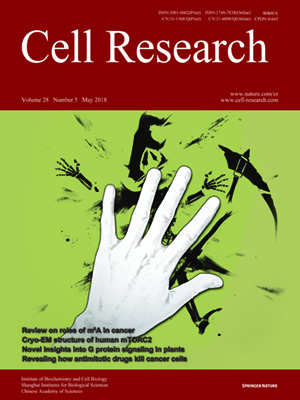Volume 28 Issue 5, May 2018: 529-543 | Open Access
ORIGINAL ARTICLES
Ligand-triggered de-repression of Arabidopsis heterotrimeric G proteins coupled to immune receptor kinases
Xiangxiu Liang 1,2, Miaomiao Ma 1,3, Zhaoyang Zhou 1, Jinlong Wang 1, Xinru Yang 4, Shaofei Rao 1, Guozhi Bi 1, Lin Li 5, Xiaojuan Zhang 1,Jijie Chai 4, She Chen 5 and Jian-Min Zhou 1,3
1State Key Laboratory of Plant Genomics, Institute of Genetics and Developmental Biology, Chinese Academy of Sciences, 100101 Beijing, China; 2State Key Laboratory of Plant
Genomics, Institute of Microbiology, Chinese Academy of Sciences, 100101 Beijing, China; 3University of Chinese Academy of Sciences, 100049 Beijing, China; 4Center for Plant
Biology, School of Life Sciences, Tsinghua University, 100084 Beijing, China and 5 National Institute of Biological Sciences, 102206 Beijing, China
Correspondence: Jian-Min Zhou (jmzhou@genetics.ac.cn)These authors contributed equally: Xiangxiu Liang, Miaomiao Ma.
Arabidopsis heterotrimeric G proteins regulate diverse processes by coupling to single-transmembrane receptors. One such
receptor is the FLS2 receptor kinase, which perceives bacterial flagellin epitope flg22 to activate immunity through a class of
cytoplasmic kinases called BIK1/PBLs. Unlike animal and fungal heterotrimeric G proteins that are activated by a ligand-induced
guanine nucleotide exchange activity of seven-transmembrane G protein-coupled receptors (GPCRs), plant heterotrimeric G
proteins are self-activating. How plant receptors regulate heterotrimeric G proteins in response to external ligands remains
unknown. Here we show that RGS1, a GTPase accelerating protein, maintains Arabidopsis G proteins in an inactive state in complex
with FLS2. Activation of FLS2 by flg22 induces a BIK1/PBL-mediated phosphorylation of RGS1 at Ser428 and Ser431 and that
promotes RGS1 dissociation from the FLS2-G protein complex. This relieves G proteins from the RGS1-mediated repression and
enables positive regulation of immune signaling. We additionally show that RGS1 is similarly regulated by multiple immune
receptors. Our results uncover ligand-induced de-repression as a mechanism for G protein signaling in plants that is distinct from
previously reported mechanism underlying the activation of heterotrimeric G proteins in other systems.
10.1038/s41422-018-0027-5
FULL TEXT | PDF
Browse 1990


